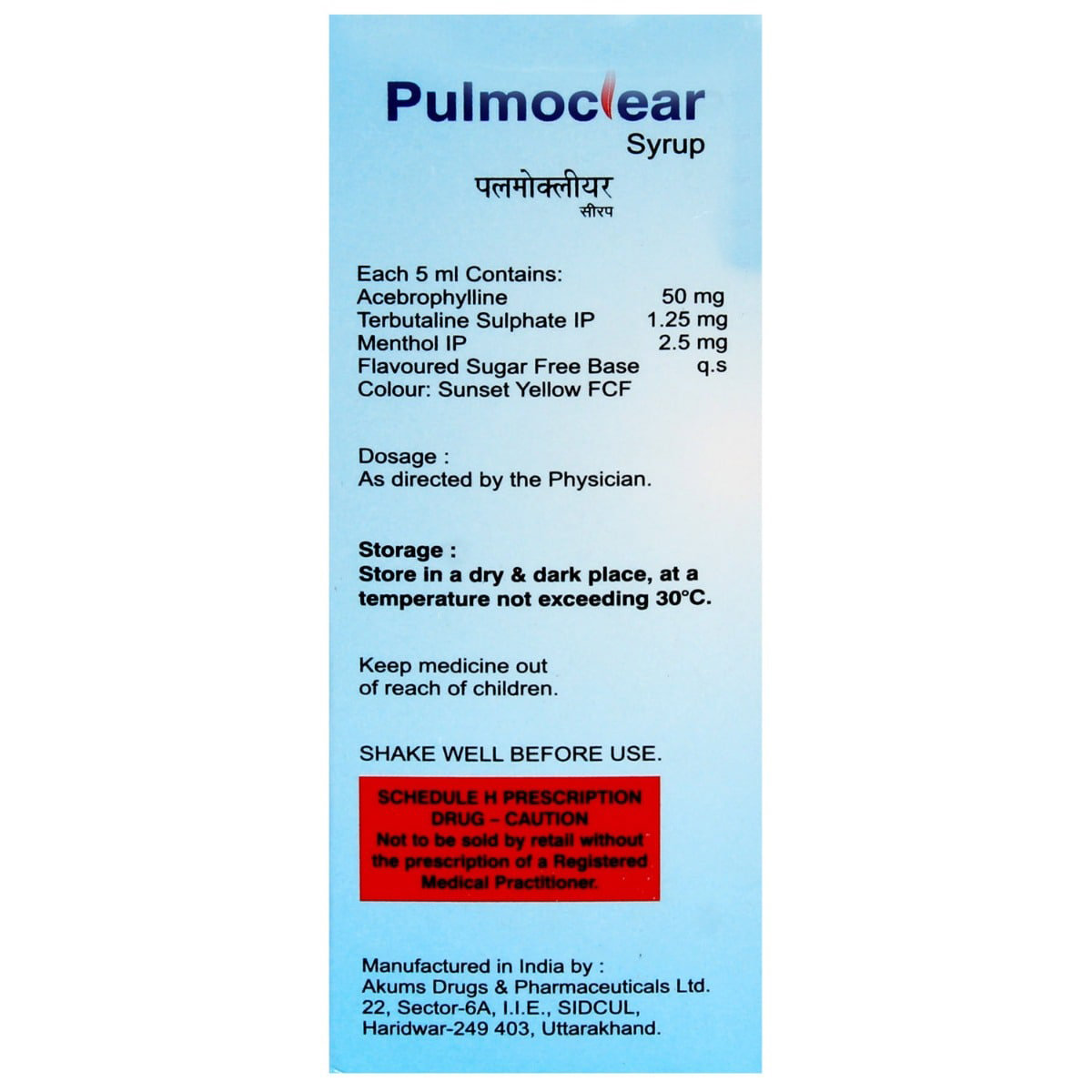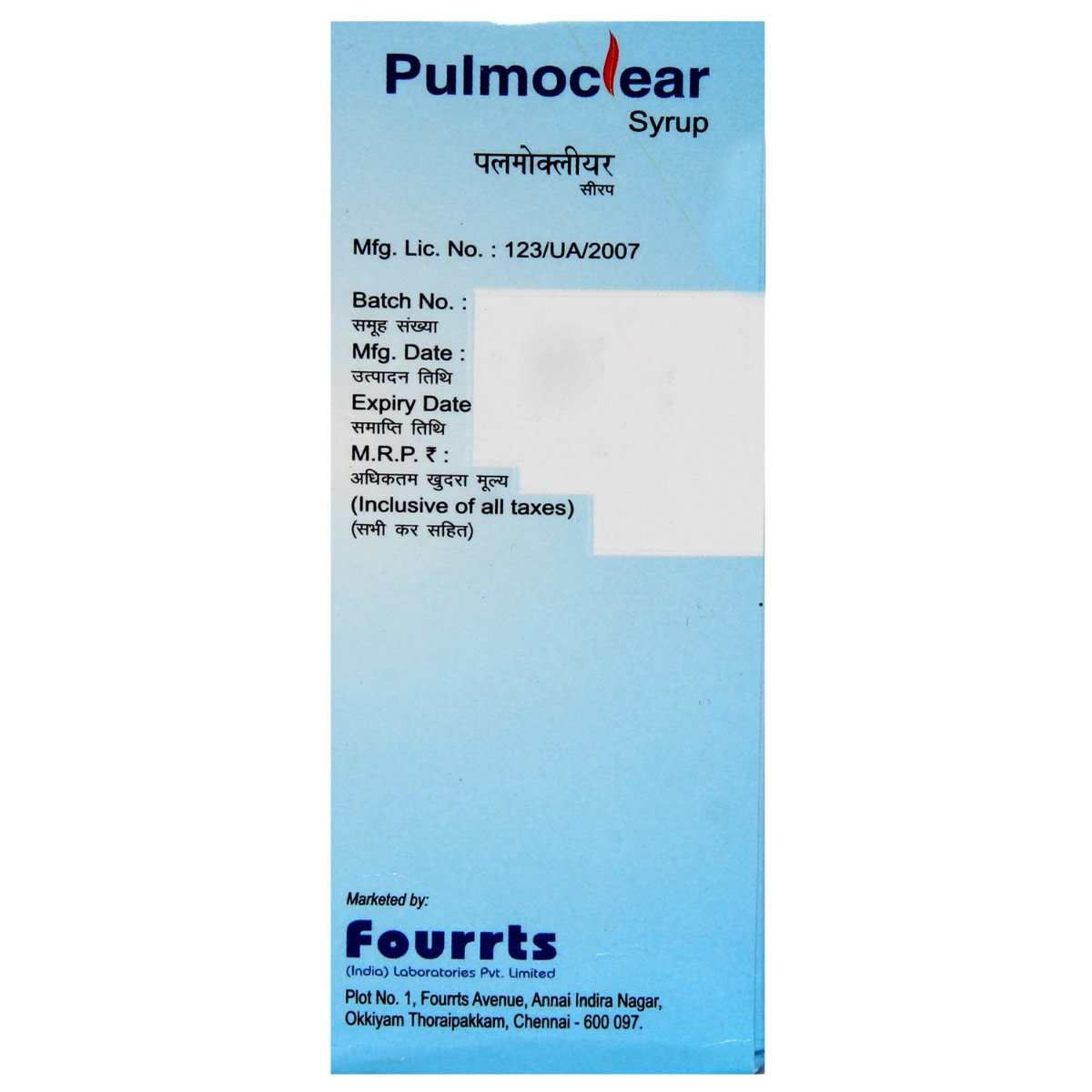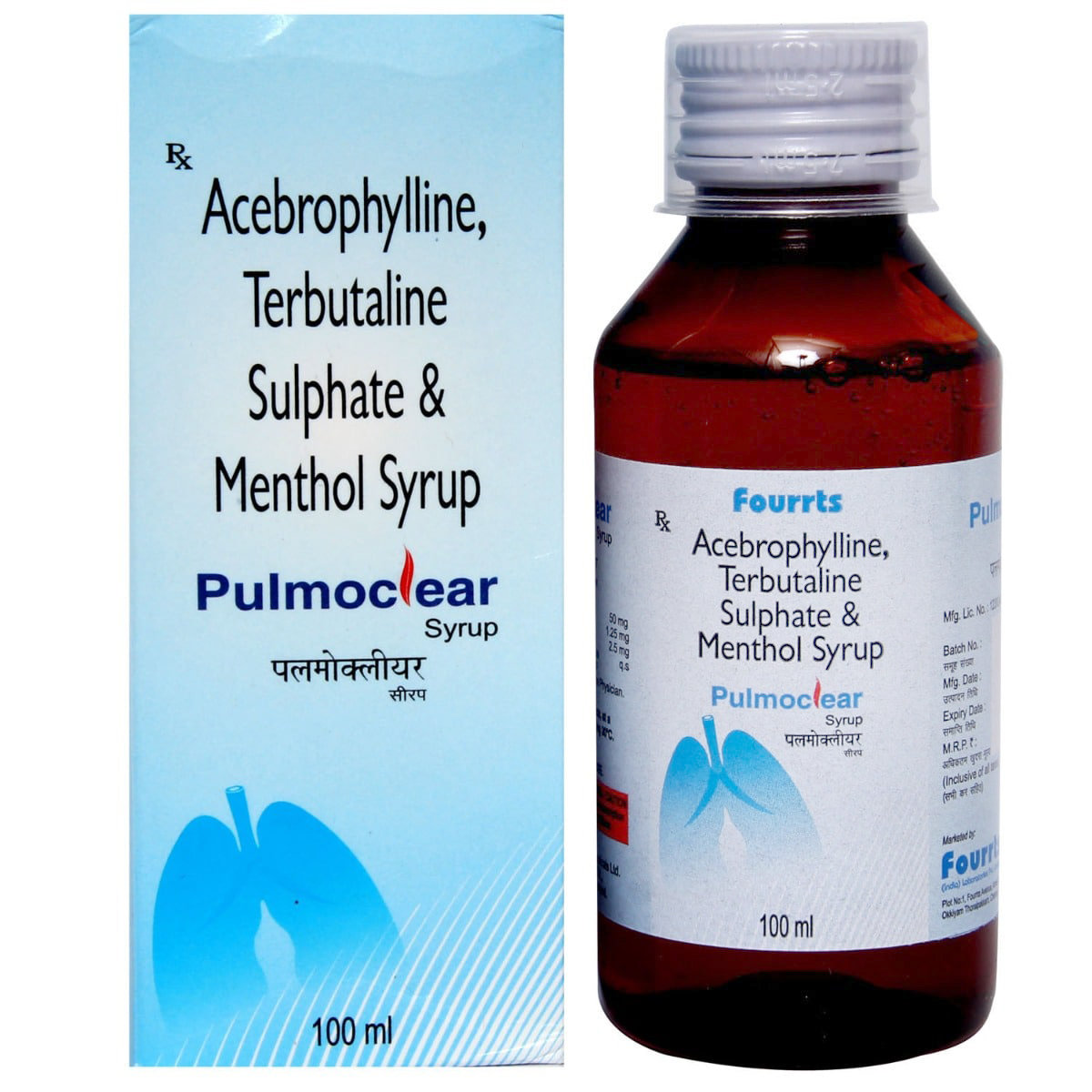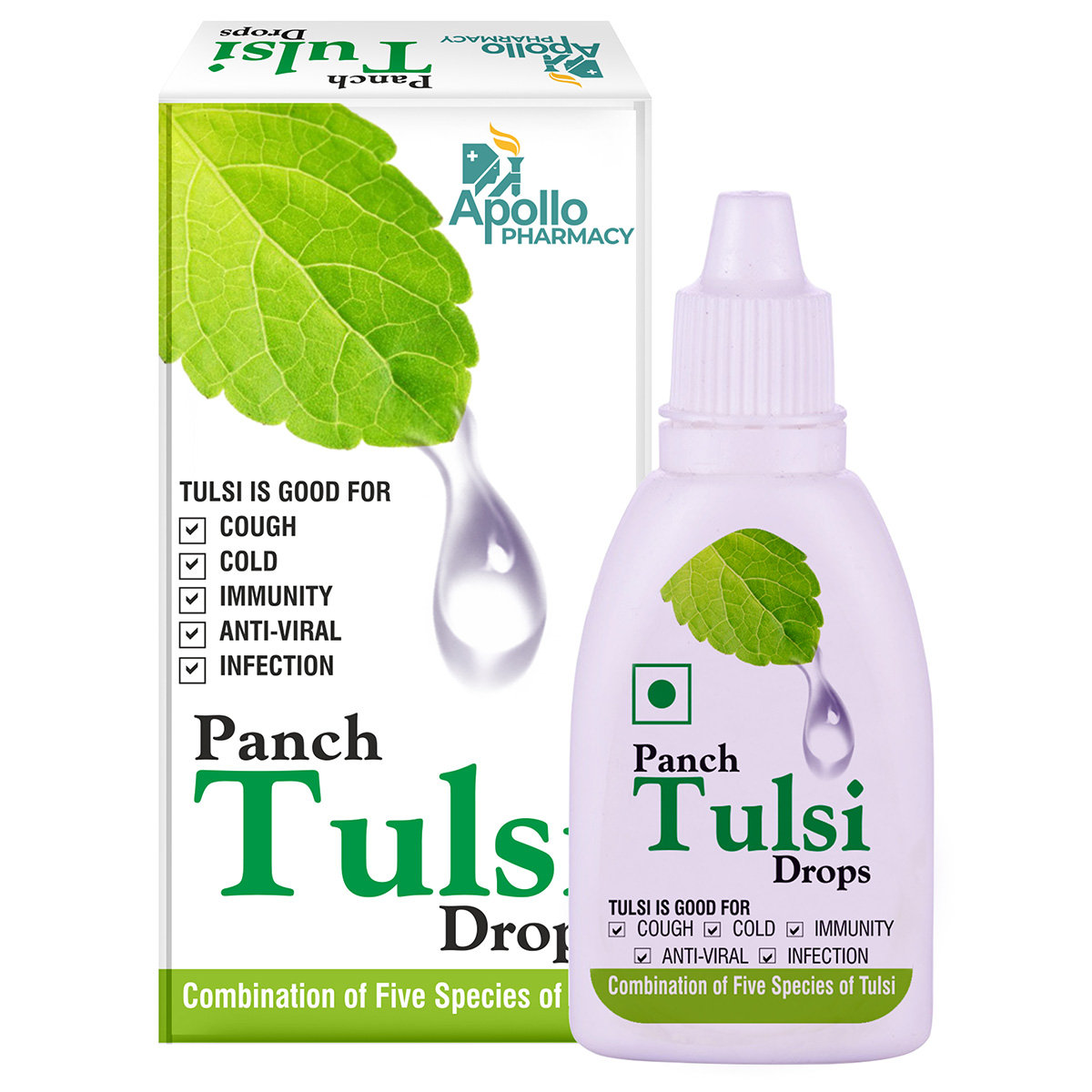Pulmoclear Syrup 100 ml
Selected Pack Size:100 ml
100 ml ₹135
(₹1.35 per ml)
In Stock
MRP ₹150
(Inclusive of all Taxes)
₹22.5 Cashback (15%)
Know Your Delivery Time
Provide Delivery Location

Secure Payment

India's Most Trusted Pharmacy

Genuine Products
Composition :
Manufacturer/Marketer :
Consume Type :
Expires on or after :
Return Policy :
About Pulmoclear Syrup
Pulmoclear Syrup belongs to the class of medicines called ‘expectorants’ primarily used to treat Asthma and Chronic obstructive pulmonary disease (COPD). Asthma is a chronic breathing problem that affects the airways in the lungs. These airways, also known as bronchial tubes, allow air to move in and out of the lungs. Chronic obstructive pulmonary disease (COPD) is a chronic lung disorder in which there is difficulty emptying the air of the lungs (airflow obstruction). Due to this obstruction, patients experience difficulty in breathing.
Acebrophylline, Terbutaline, and Menthol are the active ingredients in Pulmoclear Syrup . Acebrophylline is a bronchodilator and a mucolytic. It works by relaxing the muscles of the airways as well as thinning and loosening mucus, making breathing easier. Terbutaline functions as a bronchodilator. It works by relaxing airway muscles and widening airways. This makes it easier to breathe. Menthol is an organic chemical that generates a cooling feeling and reduces minor throat irritation. Thus, Pulmoclear Syrup relieves the symptoms of Asthma and Chronic obstructive pulmonary disease (COPD).
Take this medicine as recommended. The common side effects of Pulmoclear Syrup are stomach pain or discomfort, vomiting, constipation, heartburn, loss of appetite, drowsiness, dizziness, skin rash, itching, nervousness, tremors, and headache. Most of these side effects of Pulmoclear Syrup do not require medical attention and gradually resolve over time. However, if the side effects persist or worsen, please consult your doctor immediately.
Do not take Pulmoclear Syrup if you are allergic to any components present in it. Before taking Pulmoclear Syrup , inform your doctor if you have diabetes, fits, hypotension (low blood pressure), overactive thyroid, hypokalemia (low potassium levels in the blood), stomach ulcers, phenylketonuria (a birth defect that causes accumulation of amino acid, phenylalanine in the body), arrhythmias (abnormal heart rhythms), and kidney, liver or heart problems. Also, inform your doctor if you are pregnant, planning to become pregnant, or breastfeeding.
Uses of Pulmoclear Syrup
Pulmoclear Syrup is used in the treatment of asthma, chronic obstructive pulmonary disease (COPD). The detailed uses of Pulmoclear Syrup are as follows:
- Treatment of COPD: Pulmoclear Syrup helps keep airways open by relaxing airway muscles and reduces symptoms like chest tightness, breathlessness, wheezing, and coughing.
- Prevention of Asthma: Pulmoclear Syrup prevents asthma attacks when taken before exposure to triggers like dust, pollen, pets, or smoke.
- Relief for Cough and Congestion: Pulmoclear Syrup is commonly used to alleviate symptoms of cough and congestion in individuals with respiratory conditions.
- Mucus Clearance: Pulmoclear Syrup helps to thin and loosen mucus, making it easier to expel through coughing.
- Support during Colds and Flu: Pulmoclear Syrup can be used to support respiratory health during colds and flu, promoting easier breathing.

Have a query?
Directions for Use
- Pulmoclear Syrup can be taken with or without food. However, taking it with food may improve its absorption.
- Follow your doctor's instructions on the dosage and timing of this medication.
- Shake the bottle well before each use.
- Take the recommended dose of Pulmoclear Syrup by mouth using the measuring cup/dosing syringe/dropper provided with the pack.
- Avoid using regular household spoons, as they may not measure the dose correctly.
Key Benefits
Acebrophylline, Terbutaline, and Menthol are the active ingredients in Pulmoclear Syrup . Acebrophylline is a bronchodilator and a mucolytic. It works by relaxing the muscles of the airways as well as thinning and loosening mucus, making breathing easier. Terbutaline functions as a bronchodilator. It works by relaxing airway muscles and widening airways. This makes it easier to breathe. Menthol is an organic chemical that generates a cooling feeling and reduces minor throat irritation. Altogether it relieves the symptoms of Asthma and Chronic obstructive pulmonary disease (COPD).
How Pulmoclear Syrup Works
Storage
- Drink water or other clear fluids.
- To prevent worsening of pain, limit intake of tea, coffee, or alcohol.
- Include bland foods like rice, toast, crackers, and rice in your diet.
- Avoid lying down immediately after eating as it may cause indigestion or heartburn.
- Avoid acidic and spicy food as it may cause indigestion.
- Preventing Vomiting (Before it Happens)
- Take medication exactly as prescribed by your doctor. This can help minimize side effects, including vomiting.
- Having a small meal before taking your medication can help reduce nausea and vomiting.
- Talk to your doctor about taking anti-nausea medication along with your prescribed medication.
- Managing Vomiting (If it Happens)
- Try taking ginger in the form of tea, ale, or candy to help alleviate nausea and vomiting.
- What to Do if Vomiting Persists
- Consult your doctor if vomiting continues or worsens, consult the doctor for guidance on adjusting your medication or additional treatment.
- Inform your doctor about your constipation symptoms. They may adjust your medication or advise alternative treatments.
- Stay hydrated by drinking sufficient of water (at least 8-10 glasses a day) to help soften stool and promote bowel movements.
- Increase fibre intake by eating foods high in fibre, such as fruits, whole grains, vegetables and legumes, to help bulk up the stool.
- Establish a bowel routine by trying to go to the bathroom at the same time each day to train your bowels.
- Engaging in regular exercise, like walking or yoga, can support in bowel movement stimulation.
- Consult your doctor if constipation persists, and discuss alternative treatments or adjustments to your medication.
- Skin rash caused by allergies is due to irritants or allergens. Therefore, avoid contact with such irritants.
- Consult your doctor for proper medication and apply an anti-itch medication. Follow the schedule and use the medication whenever needed.
- Protect your skin from extreme heat and try to apply wet compresses.
- Soak in the cool bath, which gives a soothing impact to the affected area.
- Report the itching to your doctor immediately; they may need to change your medication or dosage.
- Use a cool, damp cloth on the itchy area to help soothe and calm the skin, reducing itching and inflammation.
- Keep your skin hydrated and healthy with gentle, fragrance-free moisturizers.
- Try not to scratch, as this can worsen the itching and irritate your skin.
- If your doctor prescribes, you can take oral medications or apply topical creams or ointments to help relieve itching.
- Track your itching symptoms and follow your doctor's guidance to adjust your treatment plan if needed. If the itching persists, consult your doctor for further advice.
What if I have taken an overdose of Pulmoclear Syrup
Drug Warnings
If you are pregnant or breastfeeding, it is advised to inform your doctor before using the Pulmoclear Syrup . Pulmoclear Syrup should be used with caution in patients with heart diseases, liver problems, kidney diseases, electrolyte disturbances, thyroid disorders, and arrhythmias (abnormal heart rhythms). Pulmoclear Syrup should be used with caution in patients with fits, as it may increase the recurrence of fits. Pulmoclear Syrup may raise blood glucose levels, so this medicine should be used with caution in patients with diabetes. Pulmoclear Syrup should be used with caution in elderly patients as they are more prone to side effects such as dizziness and drowsiness.
Drug-Drug Interactions
Drug-Drug Interactions
Login/Sign Up
-
How to manage the interaction:
Co-administration of Pulmoclear Syrup 100 ml with Procarbazine can possibly result in an interaction, but it can be taken if your doctor has advised it. Do not discontinue any medications without first consulting your doctor.
Combining Pulmoclear Syrup 100 ml and nilotinib can increase the risk of an irregular heart rhythm.
How to manage the interaction:
Taking Pulmoclear Syrup 100 ml and nilotinib together can lead to an interaction, it can be taken if advised by your doctor. However, if you experience any symptoms like sudden dizziness, lightheadedness, fainting, shortness of breath, heart palpitations, diarrhea, or vomiting, contact your doctor immediately. Do not discontinue any medications without first consulting your doctor.
Taking Gatifloxacin and Pulmoclear Syrup 100 ml can increase the risk or severity of irregular heart rhythms. The risk increases in patients with a history of heart illness or electrolyte imbalance.
How to manage the interaction:
Taking Gatifloxacin and Pulmoclear Syrup 100 ml together can possibly result in an interaction, it can be taken if your doctor has advised it. However, if you experience sudden dizziness, lightheadedness, fainting, shortness of breath, chest pain or tightness, rapid heartbeat, or memory loss, contact a doctor immediately. Do not discontinue any medications without consulting a doctor.
Taking Pulmoclear Syrup 100 ml with Ziprasidone can increase the risk of abnormal heart rhythm.
How to manage the interaction:
Co-administration of Ziprasidone with Pulmoclear Syrup 100 ml can possibly result in an interaction, but it can be taken together if prescribed by a doctor. However, consult your doctor if you experience sudden dizziness, lightheadedness, fainting, shortness of breath. Do not discontinue any medications without consulting a doctor.
Combining Tranylcypromine with Pulmoclear Syrup 100 ml can increase the risk of high blood pressure.
How to manage the interaction:
Although taking Pulmoclear Syrup 100 ml and Tranylcypromine together can evidently cause an interaction, it can be taken if your doctor has suggested it. If you take multiple medications that can raise your blood pressure, it may increase your risk of having high blood pressure while lying down. It's important to regularly check your blood pressure, especially when lying down or with your head elevated, and watch out for any signs of side effects. Do not stop using any medications without a doctor's advice.
Co-administration of Labetalol and Pulmoclear Syrup 100 ml together can decrease the medical benefits of both medications.
How to manage the interaction:
Although taking Labetalol and Pulmoclear Syrup 100 ml together can result in an interaction, it can be taken if a doctor has prescribed it. Do not forget to inform the doctor if you have severe chronic obstructive pulmonary disease (COPD) or a history of asthma, as labetalol is often not advised in these conditions. Do not discontinue any medications without a doctor's advice.
Taking Carvedilol and Pulmoclear Syrup 100 ml may reduce the beneficial effects of both medications.
How to manage the interaction:
There may be a possibility of interaction between Pulmoclear Syrup 100 ml and Carvedilol, but it can be taken if prescribed by a doctor. Consult your doctor immediately if you experience shortness of breath, palpitations, or chest discomfort. Do not stop using any medications without a doctor's advice.
The combined use of Pulmoclear Syrup 100 ml and Disopyramide can increase the risk of an irregular heart rhythm.
How to manage the interaction:
Co-administration of Pulmoclear Syrup 100 ml and Disopyramide can lead to an interaction, it can be taken if advised by your doctor. However, if you experience any symptoms like sudden dizziness, lightheadedness, fainting, shortness of breath, heart palpitations, diarrhea, or vomiting, contact your doctor immediately. Do not discontinue any medications without first consulting your doctor.
Taking Pulmoclear Syrup 100 ml with ceritinib can increase the risk of irregular heart rhythm.
How to manage the interaction:
Although there is a interaction between Ceritinib and Pulmoclear Syrup 100 ml, you can take these medicines together if prescribed by your doctor. However, consult your doctor immediately if you experience symptoms such as dizziness, lightheadedness, fainting, shortness of breath, or heart palpitations. Do not stop using any medications without talking to a doctor.
Taking Efavirenz and Pulmoclear Syrup 100 ml can increase the risk or severity of irregular heart rhythms. The risk increases in patients with a history of heart illness or electrolyte imbalance.
How to manage the interaction:
Taking Efavirenz and Pulmoclear Syrup 100 ml together can result in an interaction, it can be taken if your doctor has advised it. However, if you experience sudden dizziness, lightheadedness, fainting, shortness of breath, chest pain or tightness, rapid heartbeat, or memory loss, contact a doctor immediately. Do not discontinue any medications without consulting a doctor.
Drug-Food Interactions
Drug-Food Interactions
Login/Sign Up
Diet & Lifestyle Advise
Avoid dairy products such as milk as they may increase mucus production. Also, avoid processed or refined foods to have relief from cough. Instead, replace baked foods, fried foods, white bread, white pasta, French fries, sugary desserts, and chips with green leafy vegetables.
Drink plenty of fluids to avoid dry throat while you cough and loosen mucus.
Avoid citrus fruits as they may worsen the cough. Eat fruits rich in water content, such as pears, watermelon, peaches, and pineapples. Honey can also help to reduce cough.
Use a cool-mist humidifier as it may help ease coughing.
Habit Forming
Therapeutic Class
All Substitutes & Brand Comparisons
RX
Ebclear Sugar Free Syrup 100 ml
Mmc Pharmaceuticals Ltd
₹131
(₹1.18/ 1ml)
12% CHEAPERRX
Oxydex Syrup 60 ml
Apex Laboratories Pvt Ltd
₹92.5
(₹1.39/ 1ml)
2% COSTLIER
Alcohol
Safe if prescribed
Consumption of alcohol may increase the risk of side effects such as drowsiness. So, limit alcohol intake until your condition improves.
Pregnancy
Consult your doctor
Pulmoclear Syrup should not be taken until recommended. Your doctor will weigh the benefits and potential risks before advising them. Please consult your doctor.
Breast Feeding
Consult your doctor
Pulmoclear Syrup passes into breast milk and causes harmful effects to the nursing baby. So, its use should be avoided in breastfeeding mothers.
Driving
Safe if prescribed
Pulmoclear Syrup may cause drowsiness. So, driving or operating heavy machinery is not advised.
Liver
Consult your doctor
Pulmoclear Syrup should be used with caution in patients with liver diseases. The dose may have to be adjusted by your doctor.
Kidney
Consult your doctor
Pulmoclear Syrup should be used with caution in patients with kidney diseases. The dose may have to be adjusted by your doctor.
Children
Safe if prescribed
Pulmoclear Syrup to be taken with caution, especially if you are children below 12. Your doctor may adjust your dose depending on your age.
Heart
Pulmoclear Syrup should be used with caution in patients with heart problems. Inform your doctor about any heart-related conditions before taking Pulmoclear Syrup .
Geriatrics
Consult your doctor
Pulmoclear Syrup should be given with caution in elderly patients due to an increased risk of side effects. Seek medical advice before using Pulmoclear Syrup .
FAQs
Pulmoclear Syrup is used to treat Asthma and Chronic obstructive pulmonary disease (COPD).
The active components in Pulmoclear Syrup are acebrophylline, terbutaline, and menthol. Acebrophylline is a mucolytic and a bronchodilator. It works by relaxing airway muscles and thinning and loosening mucus, making breathing easier. Terbutaline has bronchodilator properties. It works by relaxing the muscles in the airways and expanding them. This makes breathing easier. Menthol is an organic compound that produces a cooling sensation and alleviates minor throat discomfort. It effectively treats the symptoms of Asthma and Chronic Obstructive Pulmonary Disease (COPD).
Pulmoclear Syrup should be used with caution in elderly people as the risk of side-effects such as dizziness and drowsiness are higher in this population.
Pulmoclear Syrup may raise blood glucose levels. So, this medicine should be used with caution in patients with diabetes. Before taking Pulmoclear Syrup , it is advised to discuss the possible benefits and risks of this medicine.
Yes, Pulmoclear Syrup may cause drowsiness or dizziness. It is not necessary for everyone taking Pulmoclear Syrup to experience this side effect. However, avoid driving if you feel drowsy or dizzy after taking Pulmoclear Syrup .
Pulmoclear Syrup should be taken orally. Shake the bottle thoroughly before each use. Take the recommended dose of Pulmoclear Syrup using the provided measuring cup, dosing syringe, or dropper provided in the package.
The side effects of Pulmoclear Syrup include vomiting, stomach pain or discomfort, constipation, heartburn, loss of appetite, drowsiness, dizziness, skin rash, itching, nervousness, tremors, and headache. Consult the doctor if any of these side effects persist or worsen.
Pulmoclear Syrup should not be taken if you are allergic to any of its ingredients. If you are unsure, it is important to consult the doctor before using Pulmoclear Syrup to ensure it is safe for you.
No significant interactions have been identified for Pulmoclear Syrup with other medications. However, it is always advisable to inform your doctor about all the medications, supplements, or herbal products you are taking with Pulmoclear Syrup to ensure safety based on your specific health condition.
In case of an overdose of Pulmoclear Syrup , seek immediate medical attention by contacting the doctor, or a poison control centre. Provide detailed information about the medication, dosage, and time of ingestion. Avoid inducing vomiting unless instructed by the doctor, and follow their guidance carefully.
Country of origin
Manufacturer/Marketer address
Disclaimer
Author Details
We provide you with authentic, trustworthy and relevant information












